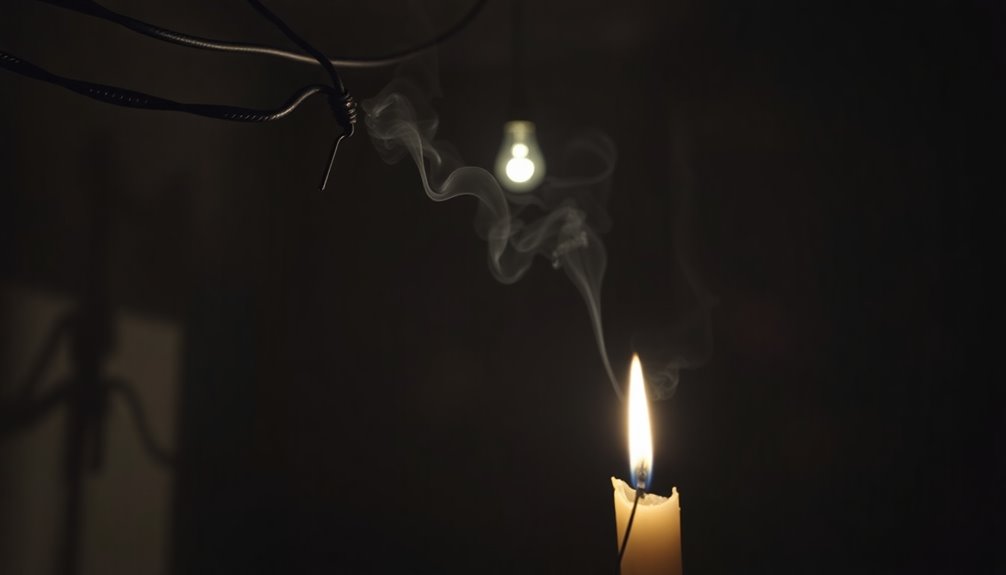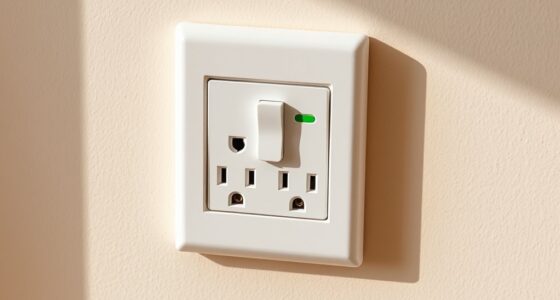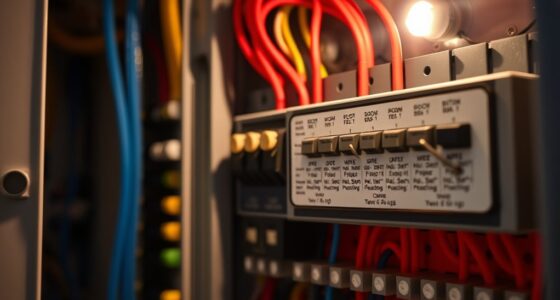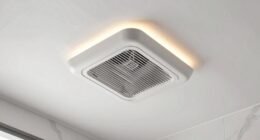If you smell an electrical burning odor, it's a serious warning sign that you can't ignore. This smell often indicates overloaded circuits, faulty wiring, or damaged appliances, all of which raise the risk of fires in your home. Look for signs like hot wires, flickering lights, or unusual smells near outlets; these can help you identify the source. Evacuate immediately, contact the fire department, and steer clear of attempting any fixes yourself. Your safety is paramount, and understanding these signs could prevent disaster. Keep going to discover more potential hazards and steps you can take.
Key Takeaways
- Electrical burning smells often indicate overloaded circuits, faulty wiring, or defective components, posing a serious fire risk in homes.
- Common smells include burning plastic, rubber, and fishy odors, each signaling different types of electrical issues.
- Immediate action is crucial: evacuate, ventilate the area, and call the fire department if you detect burning odors.
- Regular inspections and maintenance by a qualified electrician can prevent dangerous electrical problems and ensure safety.
- Look for signs such as hot wires, sparks, or discoloration, as these indicate urgent electrical hazards that require professional attention.
Causes of Electrical Burning Smell
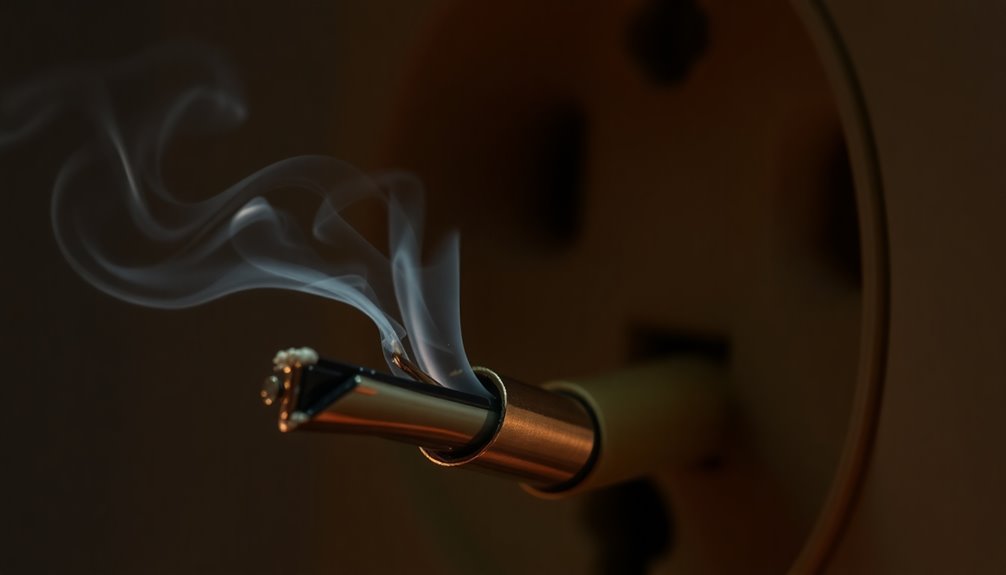
When you catch a whiff of an electrical burning smell, it's crucial to pinpoint the cause quickly. Overloaded circuits are a common culprit, especially in older homes where the wiring isn't equipped for today's appliances. If you've recently added multiple outlets to a circuit meant for a single outlet, you might be experiencing excessive load, leading to overheating and that dreaded smell.
Faulty or worn-out wires can also be to blame. Loose or frayed wires create friction, which can cause overheating. If you notice copper oxidation or visible corrosion, it's time to inspect those wires, as they pose a serious fire hazard. Regular checks for wiring integrity are essential to ensure the safety of your electrical system.
Additionally, defective electrical components like switches and circuit breakers can generate burning odors. If an appliance malfunctions or has internal wiring issues, it can overheat, giving off that burning smell.
Lastly, external factors like storm damage or moisture can affect electrical connections, further contributing to the issue. So, when you detect that smell, act fast! Unplug appliances, shut off the main circuit breaker, and consult a professional electrician to identify and resolve the problem before it escalates.
Identifying Potential Sources
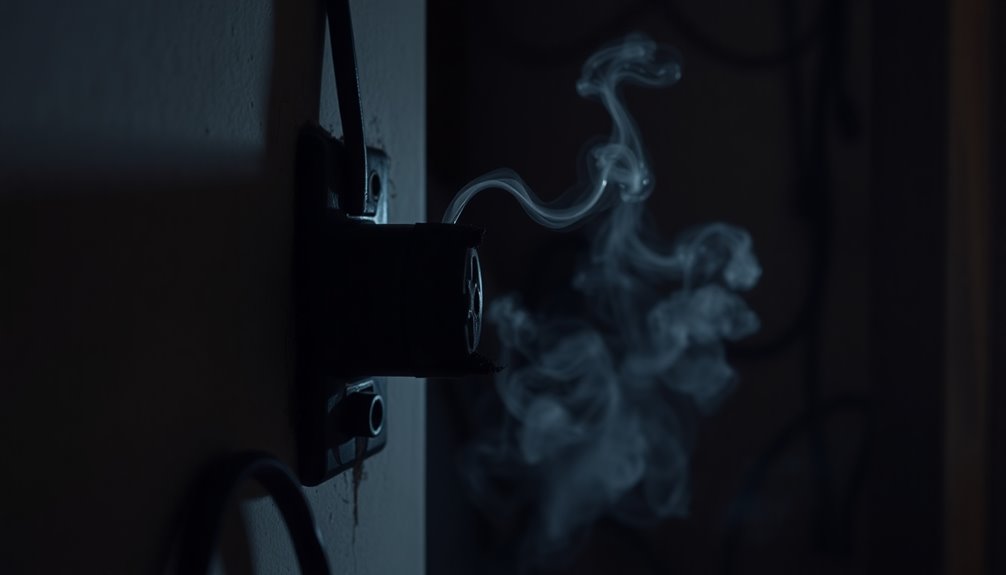
Detecting the source of that electrical burning smell is vital for ensuring safety in your home. Start by checking for overloaded circuits. If you've added multiple outlets to a single circuit, you might be pushing it beyond its limits, causing wires to heat up and potentially melt. Pay attention to how often your circuit breakers trip, as frequent interruptions can signal overload issues.
Next, inspect your wiring. Worn or damaged wires can create sparks and generate heat due to friction. Look for signs of corrosion or fraying on visible wires. Loose connections inside appliances can also lead to burning smells, so make sure everything's secure. Additionally, be aware that faulty wiring is a common cause of electrical fires, which highlights the importance of regular inspections.
Faulty appliances might be another culprit. If an appliance emits a burning odor, it could indicate internal wiring issues or malfunctioning components. Always unplug any suspected appliance immediately to prevent further risk.
Don't overlook other electrical issues, like malfunctioning switches or discolored outlets, which can also produce burning smells. Regular maintenance and inspections by a qualified electrician can help catch these problems before they escalate, ensuring the safety of your home and loved ones.
Understanding Types of Burning Smells
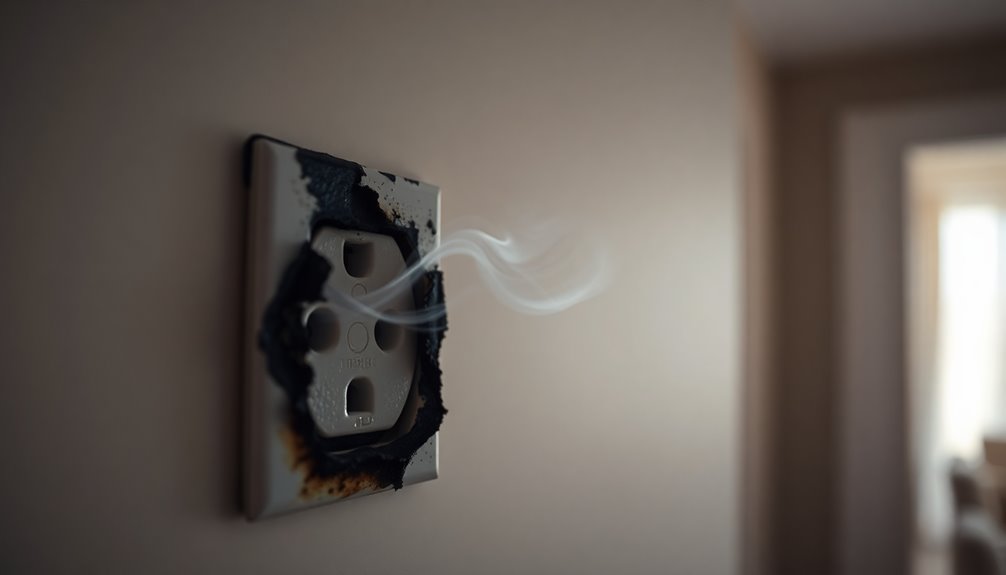
How can you differentiate between various burning smells in your home? Understanding these distinct odors is crucial for your safety. A burning plastic smell often indicates melting plastic insulation on electrical wiring. It has an acrid, unpleasant scent, similar to burning rubber. This smell typically arises from overloaded circuits or damaged wire insulation.
On the other hand, a burning rubber smell can be hard to distinguish from burning plastic, as both stem from melting insulation. It usually comes from overheating electrical components, so keep an eye out for it near junction boxes or sockets. Prolonged overheating increases the fire risk, so address this issue promptly if detected.
If you detect a fishy smell, take it seriously; it's often an early warning sign of an electrical fire. This unique odor comes from heated chemical coatings on electrical parts and signals overheating components that could ignite.
Finally, a pungent or sewer gas smell indicates a more advanced stage of burning due to the combustion of various materials. This odor often means there's a serious issue, possibly from an overloaded circuit. If you notice any of these scents, act swiftly to prevent a potential fire hazard!
Health and Safety Risks
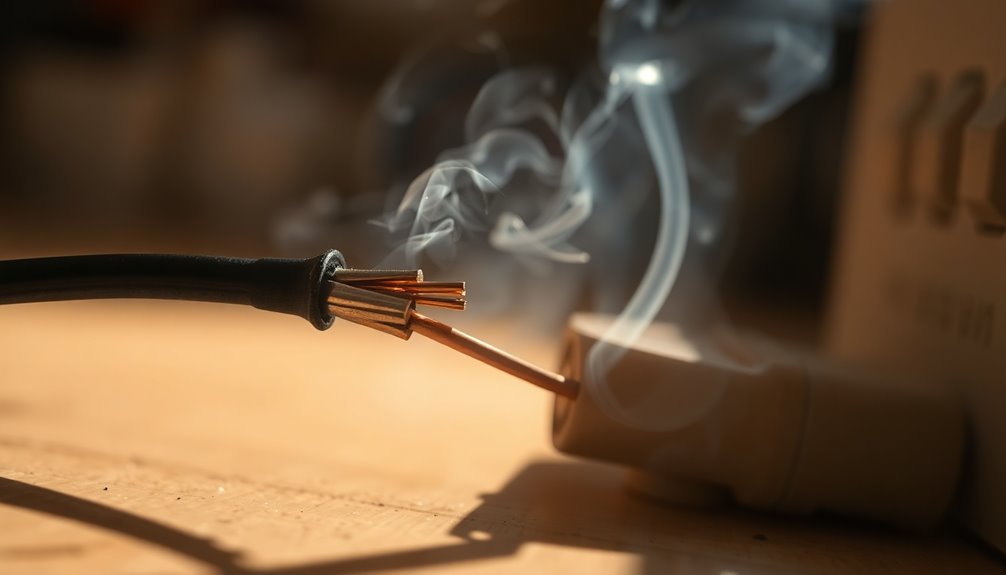
Ignoring burning smells in your home can lead to serious health and safety risks. When you inhale toxic particles released from overheating electrical components, you could face severe respiratory issues. The acrid smell from these chemicals isn't just unpleasant; it can trigger breathing difficulties and worsen conditions like bronchitis and asthma, especially if you're already dealing with respiratory problems.
On the safety side, burning smells are often a sign of potential electrical hazards. They can indicate faulty wiring or overloaded circuits, which expose you to risks of electrical shocks and injuries. If an electrical fire starts, it can spread rapidly, endangering lives and causing significant property damage. The smoke generated from such fires contains harmful substances that pose serious health threats when inhaled. Electrical fires can spread in under 30 seconds, creating dangerous conditions that necessitate prompt action.
If you notice a burning smell, don't take it lightly. Immediate action is crucial—evacuate your home and call the fire department. Never attempt to handle an electrical fire yourself; instead, shut off the power if it's safe and leave the situation to professionals. Remember, your safety and health should always come first.
Steps to Identify the Source
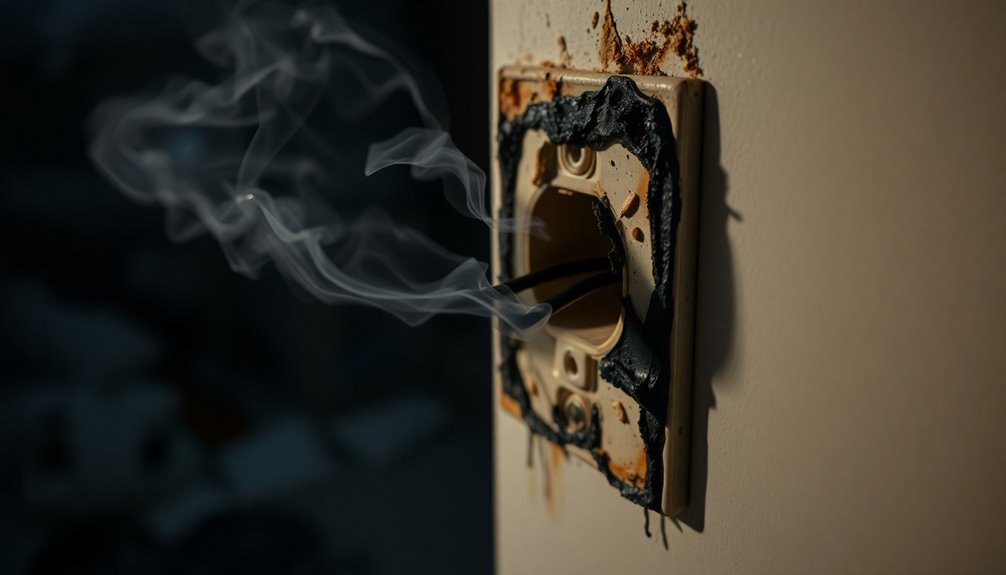
When you notice a burning smell in your home, the first step is to locate its source. Start by walking through your space, using your nose to identify where the odor is strongest. Check if it's coming from a specific appliance or a general area like the circuit breaker or fuse box. Pay attention to electrical outlets, switches, and other fixtures that might be involved.
Next, inspect your outlets for signs of overheating, like smoking or a strong burning smell. Look closely at appliance cords for fraying or exposed wiring, which can lead to arcing. Ensure that connections are secure and that no dust or grime is affecting the appliances. If you've recently added new appliances, be aware that they might produce a temporary "burn-off" smell, but keep an eye on it.
Evaluate your electrical system by checking the circuit breaker for overloaded circuits. Look for any damaged wiring or signs of corrosion. Regular inspection of load capacity is essential to avoid hazards. If you find the source, shut off the power and unplug appliances if safe. Remember, if the smell persists or you see signs of fire, contact an emergency electrician immediately.
Emergency Actions to Take
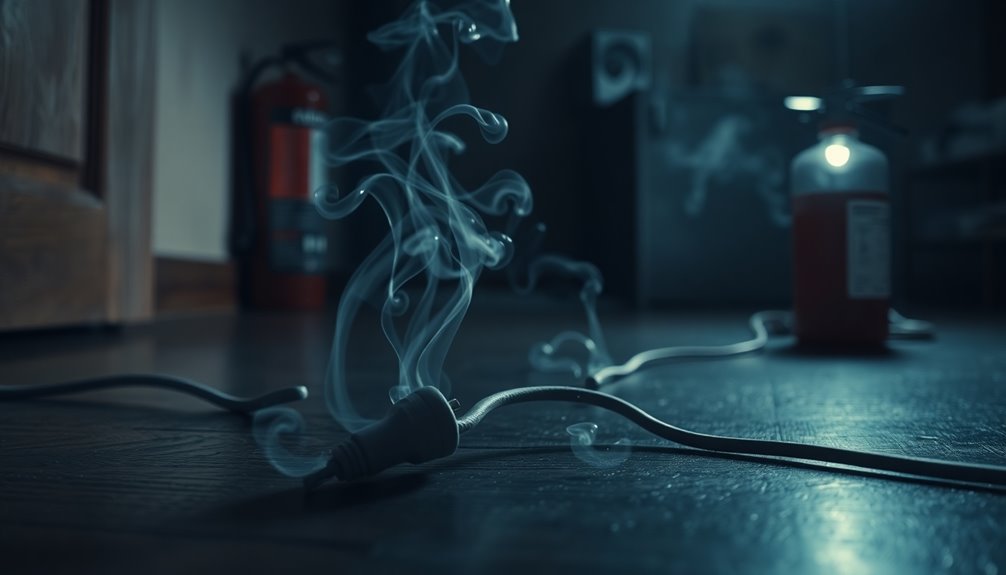
Detecting an electrical burning smell can signal a serious danger, and it's vital to act quickly. First, evacuate everyone from the premises immediately. Don't try to fight any fire yourself; electrical fires can escalate rapidly. Make sure all occupants are safely outside before taking any further action. Never re-enter the building until the fire department gives the all-clear.
Next, identify the source of the smell to determine which area to shut off. Unplug all appliances in the affected area to prevent further electrical issues. Turn off the power at the breaker box or remove the fuse. Avoid turning the power back on until a professional confirms it's safe. Exposed wires can lead to hazardous conditions, so ensure no one touches any outlets or wires until the situation is assessed.
To help dissipate the burning smell, open windows and doors for ventilation. If you notice a small, contained fire and you feel safe, use a fire extinguisher rated for electrical fires. Never use water unless the power is completely shut off. If the fire is large or spreading, wait for help from the fire department. Remember, your safety is the priority in these situations.
When to Call a Professional
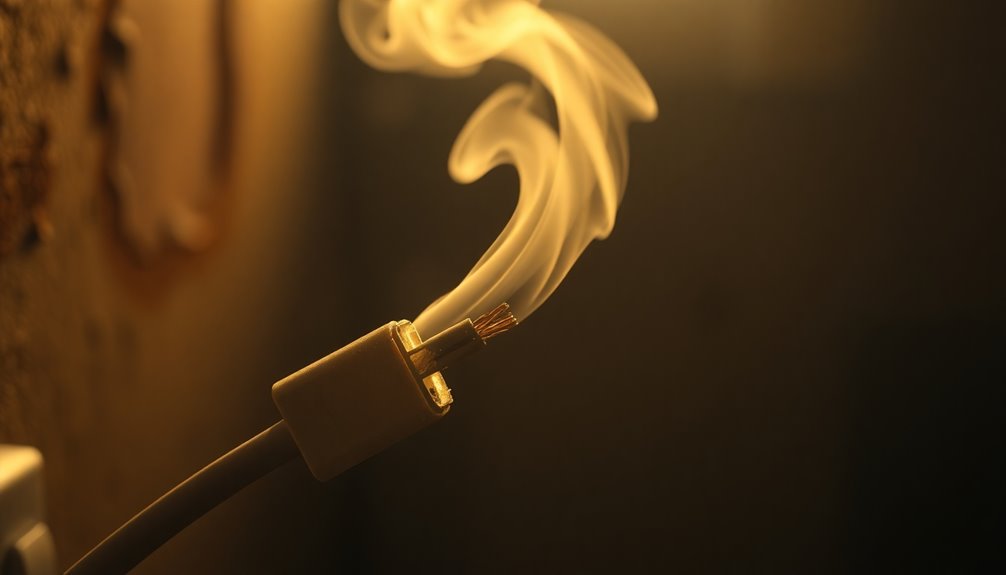
Sometimes, the presence of a burning smell can be alarming, and knowing when to call a professional is crucial for your safety. If you notice a burning odor, especially near outlets or appliances, don't ignore it. This could indicate overloaded circuits, which can lead to overheating and potential fires. Look for signs like hot wires or flickering lights.
Faulty or damaged wiring is another serious concern. If you detect a burning smell alongside sparks or discoloration on wiring, it's time to call an electrician. They can locate hidden damage and make necessary repairs. Improper grounding can also contribute to these issues, making it essential to ensure that your electrical system is properly grounded.
If the smell comes from your electrical panel, you should act immediately. This could signal overloaded circuits or loose connections, both of which require professional inspection. A burning odor resembling melting plastic is particularly dangerous.
Lastly, if appliances emit a burning smell or make unusual noises, don't hesitate to seek help. Overheating appliances can melt insulation and pose significant safety risks. A qualified electrician can diagnose the issue and ensure your home stays safe from electrical hazards. Always prioritize your safety and call a professional when in doubt.
Frequently Asked Questions
Can I Use Air Fresheners to Mask Electrical Burning Smells?
You shouldn't use air fresheners to mask electrical burning smells. They only cover up the issue temporarily and can actually decrease your awareness of potential fire hazards. Plus, air fresheners contain harmful chemicals that might irritate your health. Instead, focus on identifying the source of the smell and addressing it directly. Open windows for ventilation, clean any burnt objects, and consider professional help if the smell persists. Your safety is the priority.
How Can I Prevent Electrical Burning Smells in My Home?
To prevent electrical burning smells in your home, conduct regular inspections of outlets, cords, and wiring. Replace any damaged items immediately. Avoid overloading circuits and plug major appliances directly into wall outlets instead of using extension cords. Keep electrical cords away from carpets and ensure all installations meet safety standards. Lastly, establish an emergency plan and know how to identify the source of any unusual smells, ensuring your safety and peace of mind.
What Appliances Are Most Prone to Causing Burning Smells?
When it comes to appliances prone to causing burning smells, you should pay extra attention to kitchen devices like toasters, electric stoves, and dishwashers. Space heaters, air conditioners, and improperly maintained HVAC systems can also emit burning odors. Small appliances like irons and electric mixers can pose risks too, especially if they've got frayed cords or are misused. Regular maintenance and cautious use can help you avoid dangerous situations.
Are There Home Insurance Policies That Cover Electrical Fire Damage?
Yes, most home insurance policies do cover electrical fire damage, including those caused by faulty appliances or wiring. This coverage typically includes damage to your home's structure and personal property. However, if negligence or DIY mistakes lead to the fire, your claim might get denied. It's essential to review your policy for specific exclusions and limitations, so you know what's covered and ensure you have adequate protection. Always consult your insurance agent for clarity.
How Often Should I Have My Electrical System Inspected?
You should have your electrical system inspected every 3 to 5 years to keep it safe and efficient. If your home's older than 25 years, aim for inspections every 1 to 3 years. After major renovations or when buying or selling, get an inspection to catch any hidden issues. Regular checks help ensure your system meets modern safety standards and can prevent potential hazards before they become serious problems.
Conclusion
In conclusion, if you ever notice an electrical burning smell, don't ignore it. It's crucial to identify the source quickly to protect your home and health. Remember, understanding the different types of burning smells can help you take appropriate action. Stay vigilant, and if you're unsure or the situation escalates, don't hesitate to call a professional. Your safety is paramount, so trust your instincts and act fast to prevent potential disasters.
